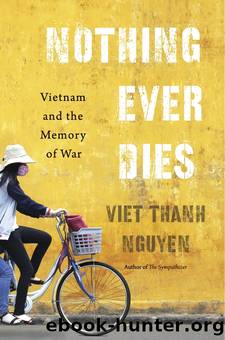Nothing Ever Dies: Vietnam and the Memory of War by Nguyen Viet Thanh

Author:Nguyen, Viet Thanh [Nguyen, Viet Thanh]
Language: eng
Format: epub
Tags: History, War, Politics
ISBN: 9780674660342
Amazon: 067466034X
Goodreads: 27311785
Publisher: Harvard University Press
Published: 2018-10-27T07:00:00+00:00
We found ourselves praying more often, trying to calm the outraged spirits of all the slain people around us.⦠Slain soldiers used to parade around the cemetery too, but whenever we kids got close, they evaporated into the mist. At night, my family would sit around and the fire and tell stories about the dead.⦠Consequently I began to think of the supernaturalâof the spirit world and the habits of ghostsâthe way others might think of life in distant cities or in exotic lands across the sea. In this discovery, I would later find I was not alone.7
The appearance of ghosts like these becomes a matter of justice, according to the sociologist Avery Gordon. Their haunting demands that âwe be accountable to people who seemingly have not counted in the historical and public record.â8 This demand weighs heavily on those investigating the warâs aftermath, like Gordonâs fellow sociologist, Yen Le Espiritu, who declares that we must âbecome tellers of ghost stories.â9 But speaking of ghosts is a dangerous act, for the storyteller must confront these ghosts, or exploit them, or return to the fatal circumstances that made them. In doing so, the storyteller must take responsibility for her tale when she invokes the dead, instead of merely claiming artistic license.
The ethical considerations for storytellers who speak of the dead and ghosts are particularly burdensome for minorities, those smaller in numbers or power. Thinking of themselves as weak or weaker, minorities may also be tempted to see themselves as victims, explicitly or implicitly. The majority may view the minority or the other as a victim, too, for that keeps the minority and the other in their places, their role to suffer and then to be saved by the powerful majority. Being a victim is a masked power that compels guilt on the part of the rescuer or the one who feels pity, but it is also a trick played on the victim for the victimâs supposed benefit. To see oneself only as a victim simplifies power and excuses the victim from the obligations of ethical behavior in politics, warfare, love, and art. Being a victim also forecloses the chance to wield real power, which the majority is not inclined to grant the minority and the other, offering them instead victimization and voice, two doors into the same trap. Ethics forces us to examine the power that we wield and the harm we ourselves can do, the dilemma that when one acts or speaks, even in the service of ghosts, one can be victimizer and victim, guilty and innocent.
Writers, artists, and critics can inflict various kinds of harm with the symbolic power they wield; so can minorities and their advocates do damage. Harm is a consequence of holding power, and even minorities and artists have some measure of power. Raising the issue of how a minority can inflict harm acknowledges that a minority is a human and inhuman agent, not merely a powerless victim, a passive subject in history, or a romanticized hero.
Download
This site does not store any files on its server. We only index and link to content provided by other sites. Please contact the content providers to delete copyright contents if any and email us, we'll remove relevant links or contents immediately.
| Archaeology | Essays |
| Historical Geography | Historical Maps |
| Historiography | Reference |
| Study & Teaching |
Underground: A Human History of the Worlds Beneath Our Feet by Will Hunt(12090)
Sapiens by Yuval Noah Harari(5366)
Navigation and Map Reading by K Andrew(5150)
The Sympathizer by Viet Thanh Nguyen(4384)
Barron's AP Biology by Goldberg M.S. Deborah T(4146)
5 Steps to a 5 AP U.S. History, 2010-2011 Edition (5 Steps to a 5 on the Advanced Placement Examinations Series) by Armstrong Stephen(3726)
Three Women by Lisa Taddeo(3424)
Water by Ian Miller(3177)
The Comedians: Drunks, Thieves, Scoundrels, and the History of American Comedy by Nesteroff Kliph(3071)
Drugs Unlimited by Mike Power(2590)
A Short History of Drunkenness by Forsyth Mark(2291)
DarkMarket by Misha Glenny(2207)
The House of Government by Slezkine Yuri(2199)
And the Band Played On by Randy Shilts(2197)
The Library Book by Susan Orlean(2064)
Revived (Cat Patrick) by Cat Patrick(1987)
The Woman Who Smashed Codes by Jason Fagone(1969)
The Absolutely True Diary of a Part-Time Indian by Sherman Alexie(1909)
Birth by Tina Cassidy(1901)
